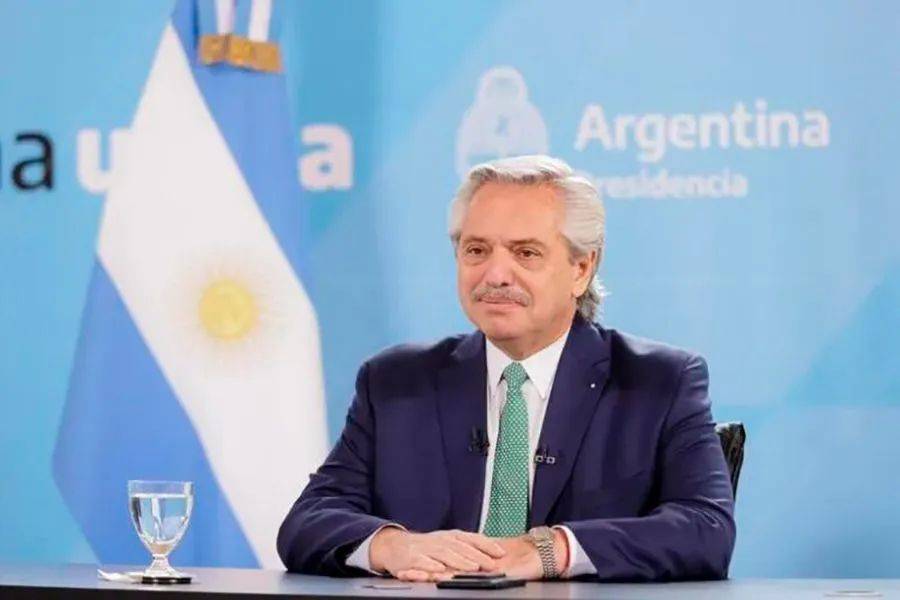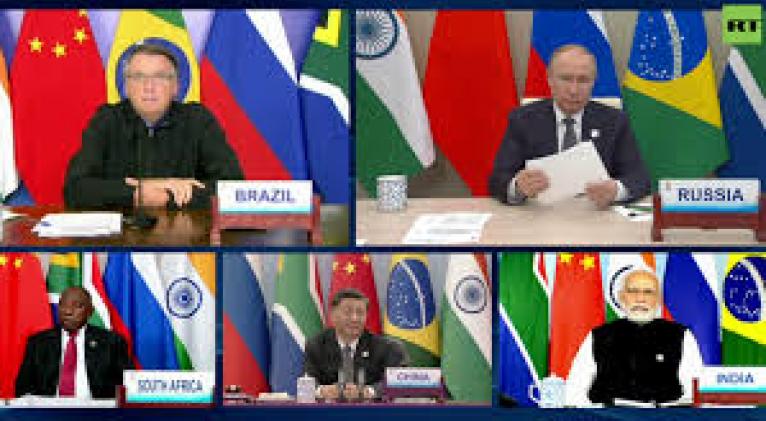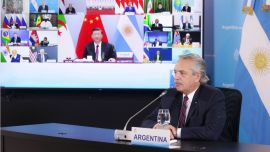据阿根廷最大英文报纸《布宜诺斯艾利斯时报》25日报道,费尔南德斯在视频讲话中表示:“我们很荣幸受邀参加这次金砖峰会的扩大会议。金砖国家涵盖了世界上42%的人口,占据全球生产总值的24%,我们渴望成为金砖国家的正式成员。”

《布宜诺斯艾利斯时报》报道:费尔南德斯呼吁金砖国家吸纳阿根廷
费尔南德斯说,金砖国家“构成了一个具备强大能力的平台,能够让各方讨论和实施未来议程,这将营造一个更美好、更公平的时代。”
他再次提到,“阿根廷希望加入这个组织,成为其中的正式成员并作出贡献。”
费尔南德斯认为,“金砖国家的制度和经济实力是实现金融稳定的因素之一”,“金砖国家新开发银行可以成为推动国家基础设施建设的有效工具”。
“现在是时候探讨合作机制了,就像阿根廷与中国签署的货币互换协议......现在同样是时候推动创建一个国际风险评级机构了,这将把当今掌握在私人利益手中的东西,交还到公众手中。”
在谈到俄乌冲突时,费尔南德斯说,“在乌克兰的敌对行动必须停止”。
“我们希望参与并寻找一种解决方案,使所有有关各方更紧密地团结在一起,以实现持久和平,彻底消除战争升级所造成的冲击。”

阿根廷总统费尔南德斯(阿根廷媒体图)
24日晚,全球发展高层对话会在金砖国家领导人第十四次会晤期间举行,对话会以视频方式举行,主题为“构建新时代全球发展伙伴关系,携手落实2030年可持续发展议程”。除金砖国家(中国、俄罗斯、印度、南非、巴西)领导人外,对话会还邀请了十多位非金砖国家领导人出席,包括阿根廷、印度尼西亚、埃及、哈萨克斯坦、塞内加尔、泰国、阿尔及利亚等国家的领导人。
金砖国家合作机制于2009年由中国、俄罗斯、巴西和印度创建,自2011年南非加入后,该机制一直没有继续吸纳新成员。早在2015年,阿根廷前总统克里斯蒂娜就曾表示,金砖国家应进一步扩员,吸收其他发展中国家加入,阿根廷希望能够加入其中。今年年初,费尔南德斯宣布在谈及金砖国家峰会时再次提到,阿根廷希望成为金砖合作机制的一员。
阿根廷驻华大使牛望道日前接受《环球时报》记者专访时重申了相同的观点。他指出,金砖国家合作机制对构建一个更加平衡的世界秩序有着深刻意义,阿根廷希望尽快成为金砖国家大家庭中的一员,并期待各方能在本月举行的金砖国家领导人第十四次会晤上就金砖扩员问题达成较为正式的方案。
他认为,如果阿根廷能加入金砖,将十分有利于中国和拉美地区关系的进一步发展。

中方:期待更多志同道合的伙伴加入金砖大家庭
在6月24日的例行记者会上,外交部发言人汪文斌就金砖合作机制扩员问题回应道:金砖国家是新兴市场和发展中国家间的重要合作机制,也是南南合作的重要平台,16年来保持良好发展态势,各领域务实合作不断走深走实,已经成为国际舞台上一支积极、稳定、建设性的力量,国际影响力和吸引力不断提升。
金砖国家机制自成立以来,就同广大新兴市场和发展中国家的命运紧紧联系在一起。新开发银行已经实现了首批扩员,将为更多发展中国家的发展提供金融支持,也将提升银行在国际金融体系中的话语权和影响力。
汪文斌同时指出,面对百年变局和世纪疫情、国际热点交织叠加的形势,金砖国家一致认为,要加强同其他新兴市场和发展中国家的合作,进一步提升金砖机制的代表性,在重大国际和地区问题上发出更响亮的“金砖声音”,携手应对挑战,维护新兴市场和发展中国家的共同利益和发展空间。
汪文斌强调,作为今年的金砖主席国,中方积极支持金砖国家启动扩员进程,拓展“金砖+”合作。在昨天举行的金砖国家领导人会晤当中,五国领导人同意继续开展“金砖+”合作,推进金砖扩员进程,有关共识也体现在会晤发表的《金砖国家领导人第十四次会晤北京宣言》当中,这充分说明金砖的合作是开放包容的。中方将推动金砖各方继续就扩员问题深入讨论,在协商一致的基础上制定扩员的标准和程序,期待更多志同道合的伙伴加入金砖大家庭。
Alberto Fernández calls for Argentina's incorporation into BRICS
https://cubasi.cu/en/news/alberto-fernandez-calls-argentinas-incorporation-brics

Buenos Aires, June 24 (RHC)-- The president of Argentina, Alberto Fernandez, asked this Friday for the incorporation of his country to the BRICS group, formed by Brazil, Russia, India, China and South Africa.
"We aspire to be full members of this group of nations that already represents 42% of the world's population and 24% of the global gross product," said the president, while participating virtually in an extended meeting at the XIV BRICS Summit.
The Argentinean president described this group as "a platform with enormous capacities to discuss and implement an agenda for the future that will lead us to a better and fairer time," for which he insisted on adding Argentina to this space, to "provide its contributions."
In that sense, in his speech, he presented the qualities that Argentina has to be part of the BRICS: "We are safe and responsible food suppliers, recognized in the field of biotechnology and applied logistics technology. This means that we are not only capable of producing and exporting food. We also know how to provide services and train specialists so that other countries can increase their productive efficiency and thus improve the quality of life of their inhabitants."
He also said that the South American country has great energy resources. "We have the second world reserve of 'shale gas' and the fourth of 'shale oil.'an Argentine and foreign companies not only exploit fossil energies in a non-conventional way, but also venture into the exploitation of lithium, green hydrogen and other renewable energies," he commented.
"Without designing an economic model that puts an end to financial exclusion, the possibility of building a more just and equitable world will end up being just a chimera," he emphasized.
He indicated that "the institutional and economic weight" of the BRICS "can become a factor of financial stability" and that the expansion of its New Development Bank "can be a useful instrument to strengthen national infrastructures."
In his speech, Fernandez proposed that it is time to promote the creation of an International Risk Rating Agency, "that puts in public hands what today is in the hands of private interests".
He also said that it is important to debate the guidelines that determine the general allocation of Special Drawing Rights (SDRs) of the International Monetary Fund. "The SDRs are also an essential tool for the necessary capitalization of the regional development banks," he said.
The President took the opportunity to thank the BRICS members for the support given to Argentina in its claim to "peacefully negotiate the Malvinas Question with the United Kingdom."
The XIV BRICS Summit, which virtually brings together the presidents of Brazil, Russia, India, China and South Africa, kicked off on Thursday. The Chinese president, Xi Jinping, is the president of this year's meeting.
WORLD | 24-06-2022 13:15
President Fernández calls for Argentina's incorporation into the BRICS group
BRICS members said in a declaration issued late Thursday that they "support talks between Russia and Ukraine" but did not lay out a pathway towards ending the war.

PRESIDENT ALBERTO FERNÁNDEZ TAKES PART IN THE 14TH BRICS SUMMIT VIA VIDEOCONFERENCE. | NA
President Alberto Fernández on Friday asked the BRICS group of emerging economies to incorporate Argentina as a full member as he joined the bloc's 14th summit via videoconference.
The Peronist leader said Argentina wanted to join talks over "an agenda for the future" and used his platform to call for changes in the way in which the Special Drawing Rights (SDRs) of the International Monetary Fund (IMF) are allocated.
"We are honoured by the invitation to this expanded BRICS meeting. We aspire to become full members of this group of nations that already represents 42 percent of the world's population and 24 percent of the global gross domestic product," said the president.
The BRICS members, made up of Brazil, Russia, India, China and South Africa, account for over 40 percent of the global population and nearly a quarter of the world's gross domestic product.
Participating virtually in the summit, Argentina's head of state said Friday that the group "constitutes a platform with enormous capacities to discuss and implement an agenda for the future that will lead to a better and fairer time."
"Argentina wants to join this space and offer its contributions as a member of it," insisted the president.
In addition to the countries that give their name to the bloc, also taking part in the meeting were the leaders of Algeria, Abdelmadjid Tebboune; of Egypt, Abdel Fattah El-Sisi; of Indonesia, Joko Widodo; of Kazakhstan, Kassym-Jomart Tokayev; of Senegal, Macky Sall; of Uzbekistan, Shavkat Mirziyoyev; of Cambodia, Hun Sen; of Ethiopia, Abiy Ahmed Ali; of Fiji, Josaia Qoreque Bainimarama; of Malaysia, Ismail Sabri Yaakob; and of Thailand, Prayut Chan-o-Cha.
Before the heads of state, Fernández asked members to "agree on a common agenda" that would allow this group of countries to convey their "concerns more effectively at the next G20 meeting," set to be held in Indonesia next November.
He also stressed that "the institutional and economic weight of the BRICS can become a factor of financial stability" and considered that "the expansion of [the bloc's] New Development Bank can be a useful instrument to strengthen national infrastructures."
"It is time to explore cooperation mechanisms, such as the currency swap that Argentina signed with China," continued the president. "It is time to promote the creation of an International Risk Rating Agency, which would put in public hands what today is in the hands of private interests."
Addressing IMF reform, Argentina's leader called for a "debating [of] the guidelines that determine the general allocation of Special Drawing Rights," describing them as "essential tools" for the "necessary capitalisation of regional development banks."
In a statement issued at the end of the two-day summit, which has been held against the backdrop of Russia's war in Ukraine, the BRICS nations called for new talks between Moscow and Kyiv.
Three members – China, India and South Africa – have abstained from voting on a United Nations resolution condemning Russia's invasion, and President Vladimir Putin has urged them to snub Western countries appalled by the attack on a European neighbour.
The five countries said in a declaration issued late Thursday that they "support talks between Russia and Ukraine" but did not lay out a pathway towards ending the war.
The countries said they had "discussed our concerns over the humanitarian situation in and around Ukraine" and expressed support for international agencies "to provide humanitarian assistance."
The United States and the European Union have slapped Russia with a barrage of sanctions since it invaded Ukraine on February 24. But China and India have attempted to stay above the fray, wary of damaging strong military and commercial links with Moscow.
South Africa, one of the few African countries wielding diplomatic influence outside the continent, has also refused to condemn Russia to safeguard important economic ties.
China and Russia have also touted a "no-limits" partnership with President Xi Jinping last week sending Putin a message of support on "sovereignty and security" issues.
The Russian President on Thursday called on BRICS leaders to work together to offset "selfish actions" from the West and push for a "truly multipolar system of inter-government relations."
Xi said Wednesday on the eve of the forum that the "Ukraine crisis is... a wake-up call" and branded sanctions a "boomerang and a double-edged sword."
Addressing the conflict in his own speech, President Fernández said it is "imperative that the hostilities in Ukraine cease."
"We want to be part of the search for a solution that brings all those involved closer together, in order to achieve a lasting peace that definitively leaves behind the dynamics unleashed by the escalation of war," said the Argentine leader.




